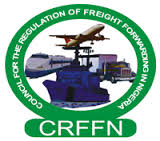The Association of Registered Freight Forwarders of Nigeria (AREFFN) has observed with dismay, the commission component attached to the payment of the Practitioners’ Operating Fee (POF) of the Council for the Regulation of Freight Forwarding in Nigeria (CRFFN) arguing that it was not part of the arrangement.
Recall that CRFFN technical experts visited the National Secretariats of the four out of the five registered freight forwarding associations last week where they sensitized the freight forwarders on how to generate invoice for the payment of the POF an exercise which lasted for two days.
Reacting to the sensitization exercise, the National President of AREFFN, Dr. Frank Ukor said that his members discovered during the demonstration of how the payment works that there was a commission of N400 and another commission of N30 to be paid, noting that his members were of the opinion that they were told that a payment of N500 was to be made per car and that they were never told of the N400 commission that accompanied the payment.
Ukor further said that he was not aware if the commission was to be paid per transaction or per vehicle saying that if it was to be paid per car, it automatically meant that the POF was no longer N500 as they were told but N930 since one would pay the initial N500 in addition to N400 and N30 commission wondering why it should be so.
He said,” Today, I have received a lot of calls from my members who were agitating and asking why it should be so. I thought it was supposed to be N500 per car and that is all. If there are 100 cars, multiply it by N500. But as it is, what is the other commission they are paying. That is what they want to know and that is why I brought it here so that you will help me highlight it so that they will attend to it. Although they (CRFFN technical team) said they were going to talk about it because they (AREFFN members) a question about it.
“So, that is the issue, that is what they were asking. But they were all in support of the POF, we told them it is a government directive and they don’t have any option than to comply.
“Other issue that was raised was why take all these efforts to generate this invoice. Why don’t we open an account in the bank so that we can go to the bank, collect their teller, put in those information, give it to them there and pay the money. They stamp for you, you collect the teller, come out, attach the teller you used to pay to your document as an evident of your payment so that as soon you pay, an alert will go to CRFFN’s office that such amount has been paid and the details of the payment should go to them. It will make it easier instead of people going to the computer where they will generate the invoice they will use, it becomes easier”.
He added,” we are asking, who is collecting that N400 and the N30? Into what account do they go to? So, these are some of the issues. We don’t have any objection, we all are in support of the collection of the POF”.
Responding in a telephone interview with Primetime Reporters, the Registrar of CRFFN, Sir Mike Jukwe explained that the N400 and N30 are bank charges saying that anytime one is paying any money online, banks normally take their charges even as he said that it was clearly stated on the transaction invoice that those money were bank charges.
“It is stated in the transaction invoice, it is stated there, everything is stated clearly, our own charges are stated clearly, the bank charges are also stated and our own charges are exactly what has been gazette, what approval we have been given”, Jukwe explained.
On whether the commissions would be paid per transaction or per vehicle, he said,” Honestly, I will not know that because it is only when you have the invoice that you know exactly. I have not paid it, so, I wouldn’t know by myself”.
Reacting on the suggestion by AREFFN that freight forwarders should be allowed to make payment to the bank instead of using the online platform, the CRFFN boss maintained that all over the world, payment was being made online adding that online payment was the best even as he recalled that the Central bank of Nigeria introduced the cashless policy which he said had eliminated the incidences of carrying cash around by the individuals.
He added,” Besides, you can pay, the way we have done this is that you can stay in your office or in your house without having contact with anyone and then the payment will be made. That is the modern way.
“You can also pay by bank now. When you generate your invoice, you take the invoice to the bank and pay. You can pay online, you can pay to the bank. You can generate the invoice online, there is a phone number that you will call and you give all the details, the transaction number. It is the most modern way, it is very convenient”.
Send your news, press releases/articles to info@primetimereporters.com. Also, follow us on Twitter @reportersinfo and on Facebook at facebook.com/primetimereporters or call the editor on 07030661526.

